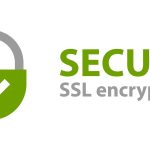In the world of internet fraud, where cybercrime activities have become the order of the day, online businesses in Nigeria require secured online communication and data protection. It is crucial to safeguard the information exchanged between online business owners and their clients.
To make your website trusted by your users, you must make it as professional and trusted as possible. One way to attain this trust is by obtaining an SSL certificate for your website.
As an online business owner, you may be wondering what an SSL certificate is, how to get it, and whether it will influence your business positively or negatively. Do not worry; this article will answer all your questions.
Table of Contents
What is an SSL Certificate?
An SSL certificate is an acronym for Secure Socket Layer certificate. It is a digital certificate that verifies a website’s identity and enables an encrypted link between a web server and a web browser. This end-to-end encryption provided by SSL, along with its renamed version TSL (Transport Layer Security), ensures that criminals do not intercept important data that users submit.
This certificate was introduced in the mid-1990s to revolutionize the transmission of sensitive data across the net by establishing trust and privacy encryption in online transactions.
Read Also: How to Start a WordPress Website Development Business
Why Do You Need an SSL Certificate For Your Business?
A website requiring users to input their credit card number, email address, password, and other sensitive details must assure them that their information is safe with you.
This SSL certificate is known to have a bunch of benefits for online businesses. Some of the benefits will be discussed below:
-
It validates your website authentication and verification
Proper authentication and verification assure users that they are sending their information to the right channel and not to a fake server trying to steal their data. This verification is possible by using Public Key Infrastructure (PKI) that will be issued with the SSL certificate.
-
It gives access to end-to-end encryption
It serves as a means of protecting sensitive information because people access your site through different computers. Unencrypted information can give third parties room for access to sensitive information about your clients, resulting in a breach of privacy, which is not good for your business.
-
It aids the search engine optimization of your website
The installation of an SSL certificate can enhance the ranking of your site. In mid-2014, Google announced that the installation of SSL certificates for online business owners would increase their search engine optimization (SEO). This means that your site making use of an HTTPS web address will be ranked before HTTP (without the S that stands for secure).
Read Also: 10 SEO Tips To Improve Your Website Ranking
-
It builds your customers’ trust
Anytime a user sees a lock in front of your web address, it gives a form of assurance. Also, the S in HTTPS, meaning secure, gives those visiting your website an assurance that they are in safe hands, unlike that of HTTP.
-
It helps to meet up with the requirement for PCI compliance
The SSL certificate is a requirement for meeting the Payment Card Industry (PCI) standard, which gives your website the right to accept credit card details from your customers.
Types of SSL certificate
SSL certificates are grouped based on their validation level and the number of domains or subdomains they secure. These include:
-
Domain validation (DV) certificate
This certificate offers a minimum form of validation and can be used by websites that don’t offer services that require the submission of sensitive details. It is the easiest and the cheapest to obtain. This server is identified by a secure HTTPS address and padlock that does not have a business name. DV UCC SSL includes three domains by default and a maximum of 250 SANs on request.
-
Organization validated (OV) certificate
This validation is similar to that of DV with a more detailed investigation. It is used by websites collecting customers’ data. It is the second most expensive certificate to secure. OV displays more company details in the address bar. A single OV Multi-Domain cert can encrypt up to 250 sites.
-
Extended validation (EV) certificate
EV certificates are the most expensive and require the most thorough verification process. Online businesses that collect sensitive user data make use of this type of certificate. This SSL certificate can be identified by HTTPS display, padlock, business name and location. EV SSL Certificate can ensure the highest level of customer trust on up to 250 domains.
-
Single-domain certificate
This certificate secures a single-domain website, that is, the base domain. That is, yourdomain.com.
-
Wildcard certificate
This certificate is used to encrypt a base domain and unlimited sub-domains. It is used to limit the cost of getting certificates for multiple sub-domains in your online businesses. Wildcard Certificate can secure anywhere from up to 100 to 250 domains.
-
Multi-domain certificate
Multi-domain certificates grant access to securing base domains along with subdomains with different top-level-level domains (TLDs). The name of the sub-domains needs to be specified on the certificate. A multi-domain SSL certificate secures up to 250 different domains.
Are you willing to discover other important things you have to know as a Business owner in Nigeria? Then subscribing to our newsletter will give you that edge above others.
What is The Cost of an SSL Certificate in Nigeria?
The cost of an SSL certificate varies in relation to the level of security, the type of certificate and the service the business offers. Bear in mind these are the lowest prices you can get them in naira:
- Domain Validated (DV) SSL certificate: N6,000 per year
- Organization Validated (OV) SSL certificate: N30,000 per year
- Extended Validated (DV) SSL certificate: N100,000 per year
- Single-Domain SSL certificate: N4,500 per year
- Multiple-Domain SSL certificate: N30,000 per year
- Wildcard SSL certificate: N60,000 per year
However, you can get some of these certificates for free, especially if you run a non-profit online business in Nigeria.
How Does The SSL Certificate Work?
It’s end-to-end encryption that functions through a form of communication process known as the handshake process because it takes place between the customer’s browser and the SSL-secured server. The process involved includes:
- The customer’s browser connects to the SSL-secured server.
- The browser inquires the server to identify itself
- A copy of the authorized SSL certificate is sent to the customer’s browser
- The browser checks the authenticity of the certificate before initiating the start of an encryption process
- Encrypted data is then sent between the two servers without a third-party interruption.
What are The Components of an SSL Certificate?
The details of your SSL certificate can also be viewed by clicking on the padlock in the address bar. The SSL certificate comprises the following details:
- The company’s website domain name
- The company’s address
- The subdomain associated with the main domain
- The name of the certificate authority issuing it
- The public key is only private to the business owner.
- The date of issue and expiry date of the certificate
Where Can You Obtain Your SSL Certificate?
An SSL certificate is obtained from trusted third-party organizations called certificate authorities (CA). These organizations are saddled with the responsibility of verifying the identity of businesses requesting this certificate.
Certificate authorities verify information like name, ownership, location, business details, etc. After the verification, the certificate is provided with a virtual signature in exchange for a small fee or free of charge for non-profitable businesses.
Read Also: Steps on How to Register your Business Name on CAC
Getting an SSL certificate from these certified authorities is quite an easy task. Some of these certified authorities include Comodo SSL Store, SSL.com, DigiCert, Sectigo, AlphaSSL, Entrust and GlobalSign.
Final Thought
An SSL certificate goes a long way in gaining your customers’ trust, building your presence online and making your business as professional as possible. Go ahead and use all that you’ve learned from this article to boost your business. Best of Luck!
Would you like to take a chance on your business with collaboration? Sponsor your business with us today to reach a wider audience.
Edited by Emmanuel Odebiyi
About Author
- Barakat is a professional content writer with competence in academic writing, ebooks, and blog posts. To help you convey your ideas to your audience, she provides articles written in the most appropriate style and tone.
Latest entries
 TechnologySeptember 13, 2023Automotive Engineering: All You Need To Know About It
TechnologySeptember 13, 2023Automotive Engineering: All You Need To Know About It Business InsightsSeptember 4, 2023Rise of Remote Work in Nigeria: Pros, Cons and Best Practices
Business InsightsSeptember 4, 2023Rise of Remote Work in Nigeria: Pros, Cons and Best Practices Business InsightsAugust 23, 2023SSL Certificate: All You Need to Know as an Online Business Owner in Nigeria
Business InsightsAugust 23, 2023SSL Certificate: All You Need to Know as an Online Business Owner in Nigeria Business InsightsJuly 24, 2023How to Start Kitchen Equipment and Utensils Business in Nigeria (Updated)
Business InsightsJuly 24, 2023How to Start Kitchen Equipment and Utensils Business in Nigeria (Updated)

